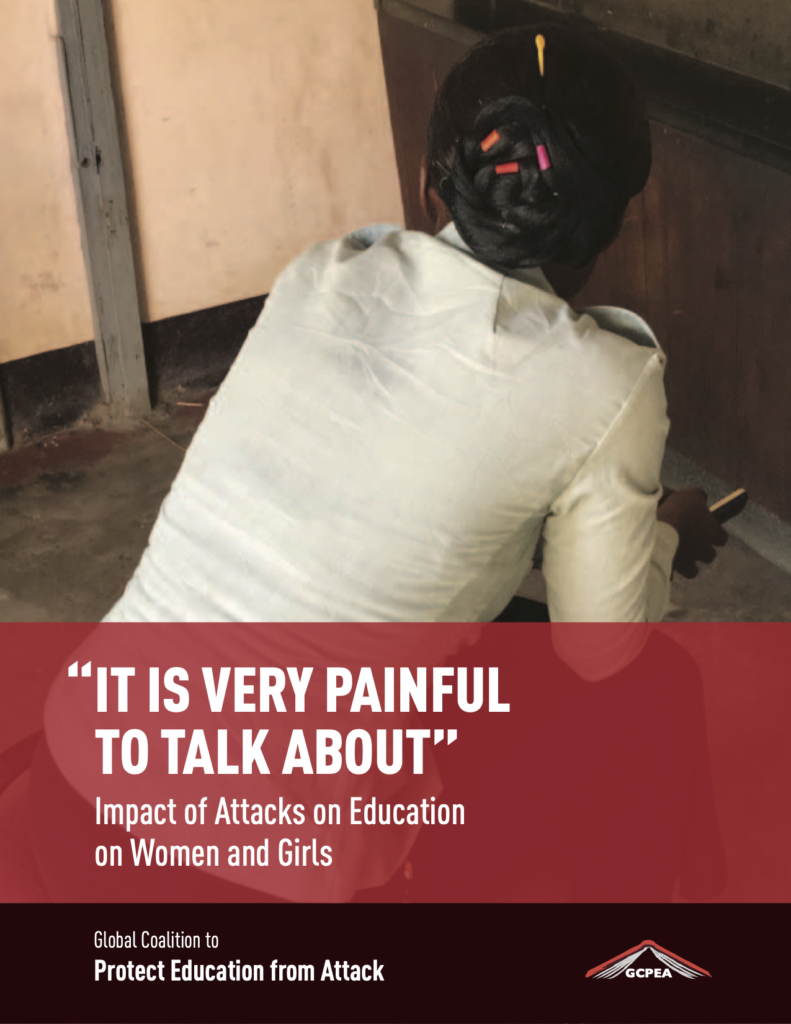GCPEA News
Girls Targeted When Schools Attacked, Impacting Lives, Education
Endorse and Use Safe Schools Declaration to Eliminate Violence Against Women
November 23, 2019
November 25, 2019
GCPEA PRESS RELEASE
Girls Targeted When Schools Attacked, Impacting Lives, Education
Endorse and Use Safe Schools Declaration to Eliminate Violence Against Women
(New York, November 25, 2019) – In conflicts around the world, female students and educators suffer horrific acts of violence within their schools and universities, including rape, forced marriage, and sexual slavery, said the Global Coalition to Protect Education from Attack (GCPEA) in a report released on the United Nations International Day for the Elimination of Violence against Women.
Attacks on education have a devastating impact on all students and teachers, but they can have particularly debilitating long-term consequences for girls and women, including early pregnancy, stigma associated with sexual violence and children born from rape, and lost education.
The 74-page report, “It is Very Painful to Talk About”: The Impact of Attacks on Education on Women and Girls, is based on extensive GCPEA research, including the Education Under Attack series, and field research in Nigeria and the Democratic Republic of Congo. The report also draws from interviews with country and regional experts and a review of secondary data sources.
“The impact of attacks on girls and women in education is profoundly injurious and long-lasting, and can dramatically affect their future prospects, as well as the futures of their communities and countries,” said Diya Nijhowne, GCPEA’s Executive Director. “Governments have an obligation to make schools safe and to protect female students and teachers from the recruitment, abduction, and sexual violence they suffer far too often.”
GCPEA found that some armed groups warn girls not to go to school, demand that teachers and parents close girls’ schools, or try to restrict the way female students and teachers dress. When girls continue to pursue their education, armed groups have responded with violence, damaging or destroying school structures and educational materials.
Armed parties commit sexual violence during attacks on schools or while students are fleeing an attack, as well as when girls are walking to and from school. In other cases, armed groups abducted female students and teachers from their schools, and some were then raped and abandoned or forcibly “married” to one or more fighters. Some reported being held for extended periods of time for purposes of sexual slavery.
Non-state armed groups sometimes forcibly recruit girls and women from schools to support their military operations, including by cooking, cleaning, and carrying supplies. In some cases, girls are used in direct combat or as suicide bombers.
GCPEA found that armed parties often use education facilities for military purposes, exposing students and teachers to the risk of retaliatory attacks. The presence of armed parties in or near schools presents particular dangers for females, including a heightened risk of sexual violence. Both government security forces and non-state armed groups have used schools for military purposes, including as detention areas, and have held and raped women and girls in the schools.
“It is very painful to talk about. I had three different husbands…. Even now, I cannot forget the smell, the odor, the horror of them coming to rape me. If you tried to resist – to say no – they would just put a gun to your head and threaten to shoot you. And then they would rape you anyway. It was sexual slavery.”
–Sadiya S., a young teacher abducted from her school in Damasak, Nigeria and held for three years by Boko Haram [1]
Girls and young women often continue to experience a wide range of harmful repercussions long after the immediate attack. One of the most devastating is the loss of education. The long-term consequences of attacks on education create almost insurmountable obstacles for girls to return to school or enjoy the benefits of an education. During insecurity, parents often pull their children out of school as a precautionary measure. Parents tend to be particularly concerned about the risk of sexual violence for their daughters and are more likely to keep them home.
The suffering of women and girls who have experienced abduction, forcible recruitment, sexual violence and a range of other abuse during attacks on education, is often compounded by the social exclusion they endure as victims of sexual violence, as well as their perceived association with militia groups. Ridicule and rejection by family and friends is particularly painful; stigma often prevents survivors from returning to school or seeking medical and psychosocial care.
Being out of school, even for relatively short periods, increases the risk of early and forced marriage for girls. Once married, girls often find it difficult to return to school because of household responsibilities, opposition from their husbands, or early pregnancy, with its accompanying host of health risks.
Girls and women have the right to education without fear of abduction, recruitment, or sexual violence. Governments can reduce harm to students and educators by endorsing and implementing the Safe Schools Declaration, an intergovernmental political commitment to protect education from attack and education institutions from military use. The Declaration has been endorsed by 100 states to date, over half of all United Nations member states. GCPEA offers guidance on how to implement the Declaration in a way that takes into account the specific needs and experiences of women and girls.
“The extreme violence suffered by female students and teachers in armed conflict underscores the urgent need for governments to adopt a no-tolerance approach to attacks on education and ensure accountability for abuses committed against girls and women,” said Nijhowne. “The Safe Schools Declaration is an effective tool for protecting education and eliminating violence against women in armed conflict. All governments should endorse and use it.”





